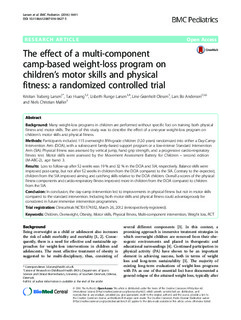The effect of a multi-component camp-based weight-loss program on children's motor skills and physical fitness: a randomized controlled trial
Larsen, Kristian Traberg; Huang, Tao; Larsen, Lisbeth Runge; Olesen, Line Grønholt; Andersen, Lars Bo; Møller, Niels Christian
Journal article, Peer reviewed
Permanent lenke
http://hdl.handle.net/11250/2427565Utgivelsesdato
2016-07-15Metadata
Vis full innførselSamlinger
- Artikler / Articles [2119]
Originalversjon
BMC Pediatrics. 2016, 16, 1-9. doi: 10.1186/s12887-016-0627-5 10.1186/s12887-016-0627-5Sammendrag
Background: Many weight-loss programs in children are performed without specific foci on training both physical fitness and motor skills. The aim of this study was to describe the effect of a one-year weight-loss program on children’s motor skills and physical fitness. Methods: Participants included 115 overweight fifth-grade children (12.0 years) randomized into either a Day-Camp Intervention Arm (DCIA), with a subsequent family-based support program or a low-intense Standard Intervention Arm (SIA). Physical fitness was assessed by vertical jump, hand grip strength, and a progressive cardio-respiratory fitness test. Motor skills were assessed by the Movement Assessment Battery for Children – second edition (M-ABC-2), age band 3. Results: Loss to follow-up after 52 weeks was 19 % and 32 % in the DCIA and SIA, respectively. Balance skills were improved post-camp, but not after 52 weeks in children from the DCIA compared to the SIA. Contrary to the expected, children from the SIA improved aiming and catching skills relative to the DCIA children. Overall z-scores of the physical fitness components and cardio-respiratory fitness improved more in children from the DCIA compared to children from the SIA. Conclusion: In conclusion, the day-camp intervention led to improvements in physical fitness but not in motor skills compared to the standard intervention. Including both motor skills and physical fitness could advantageously be considered in future immersive intervention programmes
